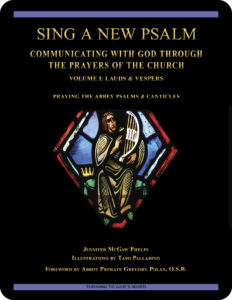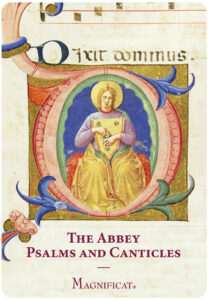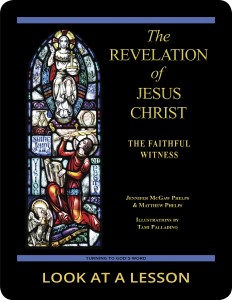 Sing a New Psalm:
Sing a New Psalm:
Communicating with God Through
the Prayers of the Church
Volume I: Lauds & Vespers
Lesson 4 To My Words Give Ear, O LORD
Psalm 5 and Psalm 19
Monday Lauds (Week I)
Revised Standard Version Catholic Edition (RSVCE)*
New American Bible Revised Edition (NABRE)*
Catechism of the Catholic Church
ex libris (in our library)
next lesson: Who May Abide in the LORD’s Tent?
This material coordinates with Lesson 4 on pages 18–21 in Sing a New Psalm: Communicating with God Through the Prayers of the Church—Volume I: Lauds & Vespers. Our Catholic Bible study is based on The Abbey Psalms and Canticles, an English translation of the Psalms prepared by the monks at Conception Abbey in 2010 and first published as The Revised Grail Psalms. The Abbey Psalms and Canticles is a revision of that work, finished in 2020 and published by the United States Conference of Catholic Bishops (USCCB). Wording and numbering of some Psalms and verses in other translations may differ. This new translation of the Psalms in the process of being added to all English-language Liturgy of the Hours books used in the United States. The USCCB also plans a liturgical Bible based on the NABRE translation.
The Abbey Psalms and Canticles, an English translation of the Psalms prepared by the monks at Conception Abbey in 2010 and first published as The Revised Grail Psalms. The Abbey Psalms and Canticles is a revision of that work, finished in 2020 and published by the United States Conference of Catholic Bishops (USCCB). Wording and numbering of some Psalms and verses in other translations may differ. This new translation of the Psalms in the process of being added to all English-language Liturgy of the Hours books used in the United States. The USCCB also plans a liturgical Bible based on the NABRE translation.
“Unlike other prayers in sacred Scripture, the prayers contained in the Psalms are not inserted into a narrative story that specifies their meaning and function. Instead, the Psalms are given to the believer precisely as a text of prayer. Since they are the Word of God, the believer who prays the Psalms speaks to God using the very words that God himself has given to us. Thus, in praying the Psalms we learn to pray. The Psalms are a school of prayer.”—Pope Benedict XVI
welcome to our in-depth study of the Psalms
We invite groups and individuals to check out the sample first lesson from this 28- lesson Turning to
lesson Turning to  God’s Word Catholic Bible study. Our online study pages include additional questions, commentary, and prayers based on the Psalm texts. Sing a New Psalm: Communicating with God Through the Prayers of the Church—Volume I: Lauds & Vespers has been granted an imprimatur. A digital version of this study can be purchased from our website shop. Volume II: Vigils, Day Prayer & Compline is scheduled for publication in 2025. If you have a Bible-related question or comment, click on one of the “ask us your question” or “what do you think” buttons on any online study page.
God’s Word Catholic Bible study. Our online study pages include additional questions, commentary, and prayers based on the Psalm texts. Sing a New Psalm: Communicating with God Through the Prayers of the Church—Volume I: Lauds & Vespers has been granted an imprimatur. A digital version of this study can be purchased from our website shop. Volume II: Vigils, Day Prayer & Compline is scheduled for publication in 2025. If you have a Bible-related question or comment, click on one of the “ask us your question” or “what do you think” buttons on any online study page.
open with prayer
It’s always wise to begin any Bible study with prayer, whether reading the Scriptures alone or meeting with others in a discussion study group. You can pray using your own words, pray one of the Psalms in this lesson, or use one of the opening prayers on our website. We especially like the following:
Lord Jesus, you promised to send your Holy Spirit
to teach us all things.
As we read and study your word today,
allow it to touch our hearts and change our lives. Amen.
praying is speaking & listening
“To My Words Give Ear, O LORD” is the theme of this lesson. Both Psalm 5 and Psalm 19 have a  decidedly auditory focus. This illustration by Turning to God’s Word co-founder Tami Palladino depicts a person in the act of praying. It’s significant that the woman pitured appears to be praying in silence, apparently trusting that God will hear the words in her mind and heart. Psalm 5 begins with a request for God to give ear or listen to the Psalmist’s words. Psalm 19 opens quite differently, with the announcement that the heavens are declaring the glory of God. What kind of signs might you expect—other than receiving exactly what you’ve prayed for—to indicate God has heard your prayers? Consider how not receiving what you want might not necessarily lead to the conclusion that God isn’t paying any attention. Click on Tami’s illustration (right) to enlarge it. Her original illustration is on page 19 in Sing a New Psalm: Communicating with God Through the Prayers of the Church—Volume I: Lauds & Vespers.
decidedly auditory focus. This illustration by Turning to God’s Word co-founder Tami Palladino depicts a person in the act of praying. It’s significant that the woman pitured appears to be praying in silence, apparently trusting that God will hear the words in her mind and heart. Psalm 5 begins with a request for God to give ear or listen to the Psalmist’s words. Psalm 19 opens quite differently, with the announcement that the heavens are declaring the glory of God. What kind of signs might you expect—other than receiving exactly what you’ve prayed for—to indicate God has heard your prayers? Consider how not receiving what you want might not necessarily lead to the conclusion that God isn’t paying any attention. Click on Tami’s illustration (right) to enlarge it. Her original illustration is on page 19 in Sing a New Psalm: Communicating with God Through the Prayers of the Church—Volume I: Lauds & Vespers.
read the Catechism—listening is tied to obedience
Paragraph 144 in the Catechism of the Catholic Church offers a clue about what it means to listen when it links listening with obedience. The Church suggests that listening requires more from us than merely acknowledging that we’ve heard sounds. Obedience of faith entails acting in  faith. If we’re asking God to listen on our behalf, this implies that we have the expectation that God also will act on our behalf.
faith. If we’re asking God to listen on our behalf, this implies that we have the expectation that God also will act on our behalf.
144 To obey (from the Latin ob-audire, to “hear or listen to”) in faith is to submit freely to the word that has been heard, because its truth is guaranteed by God, who is Truth itself. Abraham is the model of such obedience offered us by Sacred Scripture. The Virgin Mary is its most perfect embodiment.
WHAT DO YOU THINK it means to ask God to listen?
It’s worth taking a moment to consider whether you truly wish to be communicating with the Creator of the universe.
 ? Are there any things that you’d like to say to God if you were absolutely certain that God was listening?
? Are there any things that you’d like to say to God if you were absolutely certain that God was listening?
? What kinds of things do you do when you want to attract God’s attention?
? Consider whether any of these behaviors are reckless.
? How often do you truly have the expectation that God is going to hear your prayers?
? Beyond that, what expectations do you have about the ways in which God might respond?
? What can you learn from the Psalms in this lesson about how to pray in a way more pleasing to God?
? What might hold someone back from talking frankly to God?
? How can you eliminate things that stand in your way of speaking truthfully to God?
a challenge for most Christians
The pairing of Psalm 5 and Psalm 19 suggests that when we are bold enough to ask God to listen to us (and to obey us), we also should be willing to demonstrate that we’ve heard God speaking to us and have been doing our best to follow the law of the LORD (which is described as “perfect” in Psalm 19). It’s relatively easy to understand how Jesus could pray these two Psalms. It becomes much more challenging to ask God to listen to us, although it helps to consider that obedience is a particularly divine characteristic displayed by Jesus and his mother.
biblical vocabulary—firmament
Psalm 19 begins: “The heavens are telling the glory of God; and the firmament proclaims his handiwork.” Many people mistakenly assume the word firmament means the earth. This seems logical, since firmament begins with the word firm, which we know to mean hard, solid, and unyielding. The word firmament is related to those things in that it means fixed. In biblical terms, the firmament refers to the fixed space that resulted from God separating the waters on the second day of Creation.
favor with God—you could look it up in our archives
 In Psalm 5, the Psalmist entreats the LORD to pay attention to his prayer, essentially asking for God to show him favor. To learn the meaning behind the words “favor with God,” and to discover why Mary found special favor with God, you can read Lost in Translation, an online column in which Turning to God’s Word author Matthew Phelps helps readers connect with ideas expressed in the original languages of the Scriptures. New Lost in Translation entries are posted on Mondays, and past entries are archived on our website. Contact us if you’d like to receive Lost in Translation by email every week.
In Psalm 5, the Psalmist entreats the LORD to pay attention to his prayer, essentially asking for God to show him favor. To learn the meaning behind the words “favor with God,” and to discover why Mary found special favor with God, you can read Lost in Translation, an online column in which Turning to God’s Word author Matthew Phelps helps readers connect with ideas expressed in the original languages of the Scriptures. New Lost in Translation entries are posted on Mondays, and past entries are archived on our website. Contact us if you’d like to receive Lost in Translation by email every week.
 the popes inspire us—mercy, fidelity, justice & salvation
the popes inspire us—mercy, fidelity, justice & salvation
Take a minute or two to read and think about “Prayer: Source of Energy” on page 18 in Sing a New Psalm: Communicating with God Through the Prayers of the Church—Volume I: Lauds & Vespers. In this commentary, Pope St. John Paul II was moved by praying Psalm 5 to share some of the words that Christians typically use to celebrate God’s covenant with his people. Consider what other words also might be appropriate to use when addressing God.
who’s who in prayers of supplication
Psalm 5 is a prayer of supplication. As in many of these prayers, in Psalm 5 the Psalmist asks to be freed from evil. The main characters who usually appear in Psalms of supplication are described in “Three Primary Characters” on page 18 in Sing a New Psalm: Communicating with God Through the Prayers of the Church—Volume I: Lauds & Vespers.
the best Catholic commentary about Scripture
 To find out more about how Church teaching is supported by passages in Sing a New Psalm: Communicating with God Through the Prayers of the Church—Volume I: Lauds & Vespers, check out the Index of Citations in the Catechism of the Catholic Church. Links to the primary Scripture passages in the lesson (Revised Standard Version Catholic Edition [RSVCE*]) and relevant paragraphs in the Catechism are provided here. Not every passage in the biblical text for this study is referenced in a Catechism paragraph, however, including Psalm 5 in this lesson.
To find out more about how Church teaching is supported by passages in Sing a New Psalm: Communicating with God Through the Prayers of the Church—Volume I: Lauds & Vespers, check out the Index of Citations in the Catechism of the Catholic Church. Links to the primary Scripture passages in the lesson (Revised Standard Version Catholic Edition [RSVCE*]) and relevant paragraphs in the Catechism are provided here. Not every passage in the biblical text for this study is referenced in a Catechism paragraph, however, including Psalm 5 in this lesson.
Psalm 19:2—paragraph 326
Psalm 19:2–5—paragraph 299
don’t forget about our indexes & extra online material

 If you’re trying to locate information about a specific Scripture passage, you can look it up in the index at the back of the study book or sample lesson. If you want to find a particular commentary, you can look up its title in the topics index. To learn more about another book of the Bible for which there’s a Turning to God’s Word study, visit the online study directories to read the commentaries and watch any accompanying videos. Finally, if you have a question or would like to make a comment about any of our studies, you can use one of the “ask us your question” or “what do you think” buttons to email our authors.
If you’re trying to locate information about a specific Scripture passage, you can look it up in the index at the back of the study book or sample lesson. If you want to find a particular commentary, you can look up its title in the topics index. To learn more about another book of the Bible for which there’s a Turning to God’s Word study, visit the online study directories to read the commentaries and watch any accompanying videos. Finally, if you have a question or would like to make a comment about any of our studies, you can use one of the “ask us your question” or “what do you think” buttons to email our authors.
ex libris—Church documents & books about religious topics
Link to magisterial documents referred to in our Bible studies at ex libris—magisterial documents.  This listing includes significant recent encyclicals as well as a number of historical Church documents. Recommended books related to Scripture study can be found at ex libris—main bookshelf.
This listing includes significant recent encyclicals as well as a number of historical Church documents. Recommended books related to Scripture study can be found at ex libris—main bookshelf.
wondering how to pronounce some of these words?
The following links are to readings from the New International Version (NIV) Bible. To listen, open one of the links and click on the audio icon above the printed text. Although not taken from the translations used in our study materials, the NIV readings provide an audio guide to pronunciation of words in this lesson’s primary biblical texts. A close online version of the translation of the Bible used in Catholic liturgy in the United States as well as an audio guide for daily Mass readings for the current month can be found on the website of the United States Conference of Catholic Bishops (USCCB).
 close with a Psalms-based prayer for Monday Lauds (Week I)
close with a Psalms-based prayer for Monday Lauds (Week I)
Many of our Catholic study groups like to conclude their discussions with a prayer based on the scriptural focus of their lesson. If you’re uncomfortable composing your own Bible-based prayers, you can follow our four easy steps. If you prefer, you can pray any of the Psalms in this lesson, or you can use the following short prayer.
O God of mercy and love,
grant us perseverance as we strive
to act in accordance with your will.
Help us to trust that you always hear
and respond even to our unspoken prayers.
We ask this in the name of Jesus Christ,
the Word you sent in response to our deepest needs. Amen.
Lesson 5 Who May Abide in the LORD’s Tent? Monday Vespers (Week I)—Psalm 11, Psalm 15, Psalm 20, and Psalm 21
Lesson 3 You Are a Priest Forever, Sunday Second Vespers (Week I)—Psalm 110, Psalm 111, and Psalm 112
you also may like our study of the book of Revelation
 The Revelation of Jesus Christ: The Faithful Witness, a 23-lesson Catholic Bible study with an imprimatur, examines ways in which our traditional Christian view of heaven is built on Hebrew apocalyptic visions recorded in the Old Testament. This recently revised study includes maps and additional commentary and takes a close look at the role of the prophets in present-day Christianity. Illustrations by Tami Palladino depict the often-misunderstood images in the book of Revelation. Click on the book’s cover to view a sample lesson.
The Revelation of Jesus Christ: The Faithful Witness, a 23-lesson Catholic Bible study with an imprimatur, examines ways in which our traditional Christian view of heaven is built on Hebrew apocalyptic visions recorded in the Old Testament. This recently revised study includes maps and additional commentary and takes a close look at the role of the prophets in present-day Christianity. Illustrations by Tami Palladino depict the often-misunderstood images in the book of Revelation. Click on the book’s cover to view a sample lesson.
start a Turning to God’s Word Bible study
Thank you for your interest in Sing a New Psalm: Communicating with God Through the Prayers of the Church—Volume I: Lauds & Vespers. 
 More information about beginning a Turning to God’s Word Bible study can be found on this website at start a Bible study, and Tami, Matthew, and I are available to answer questions or discuss concerns. Contact us to start this or one of our other studies or to have your schedule listed with other TtGW study groups on our website. —Jennifer
More information about beginning a Turning to God’s Word Bible study can be found on this website at start a Bible study, and Tami, Matthew, and I are available to answer questions or discuss concerns. Contact us to start this or one of our other studies or to have your schedule listed with other TtGW study groups on our website. —Jennifer
*There are seven deuterocanonical books in the Old Testament—the Books of Tobit, Judith, Wisdom, Sirach, Baruch, and First and Second Maccabees, as well as some passages in the Books of Esther and Daniel. Protestants usually refer to these works as “apocryphal,” a word that means “outside the (Protestant) canon” because they’re excluded from most Protestant Bibles. The word “deuterocanonical” means “second canon”; Catholics use that word to refer to any section of the Catholic Old Testament for which there are no extant, or existing, Hebrew manuscripts. All of the deuterocanonical books appear in the Septuagint, the earliest remaining versions of which date to the 1st century B.C. This Greek translation of the Old Testament was in common use by Jews at the time of Jesus. Learn more by reading How Do Catholic & Protestant Bibles Differ?
Turning to God’s Word printed Bible studies use the 2006 Revised Standard Version Second Catholic Edition (RSV2CE) translation for all Scripture references except the Psalms, which are taken from The Abbey Psalms and Canticles, prepared by the monks of Conception Abbey and published in 2020 by the United States Conference of Catholic Bishops (USCCB). All Scripture links for the online study pages for Sing a New Psalm: Communicating with God Through the Prayers of the Church—Volume I: Lauds & Vespers are to the 1966 Revised Standard Version Catholic Edition (RSVCE) translation. The New International Version (NIV) audio recordings follow the same chapter and verse numbering as the RSV Catholic translations, but the NIV doesn’t include the deuterocanonical passages.
The 1966 RSVCE uses archaic pronouns and verb forms such as “thee,” “thou,” “didst” in the Psalms and in direct quotations attributed to God. The 2006 RSV2CE replaces these with more accessible English. The few significant translation changes in the RSV2CE include rendering almah as “virgin” in the Book of Isaiah 7:14 and restoring the term “begotten” in the Gospel According to John 3:16.
The Psalms in this Bible study reflect numbering used in The Abbey Psalms and Canticles; Psalms numbering may vary in other translations. Numbering also may vary for a few other passages in this Bible study. Turning to God’s Word studies follow the numbering in the Revised Standard Version Catholic translations (RSVCE and RSV2CE). Discrepancies in the New American Bible Revised Edition (NABRE) are noted in the Index of Scripture Citations in the study book and the online sample.
 The companion to this Catholic Bible study from Turning to God’s Word, Sing a New Psalm: Communicating with God Through the Prayers of the Church—Volume II: Vigils, Day Prayer & Compline, will cover Psalms not included in Volume I: Lauds & Vespers. Volume II: Vigils, Day Prayer & Compline is scheduled for publication in 2025.
The companion to this Catholic Bible study from Turning to God’s Word, Sing a New Psalm: Communicating with God Through the Prayers of the Church—Volume II: Vigils, Day Prayer & Compline, will cover Psalms not included in Volume I: Lauds & Vespers. Volume II: Vigils, Day Prayer & Compline is scheduled for publication in 2025.
